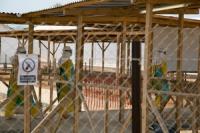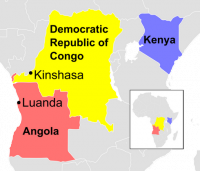-
Venezuelan vice-president is a major drug trafficker, with terrorism ties: U.S.
The Trump administration on Monday announced it had imposed sanctions on Venezuela’s vice-president, Tareck El Aissami, charging that he was a major drug trafficker. El Aissami is the most senior Venezuelan official – and one of the most senior Latin American official — to have been charged of drug offenses by the United States. El Aissami has caught the eye of U.S. law enforcement years ago, when, as interior minister in the government of Hugi Chavez, he ordered his underlings to issue dozens of fraudulent Venezuelan passports to people from the Middle East, including members of Hezbollah.
-
-
Acting fast: Two months to stop pandemic X from taking hold
Over the past several years, DARPA-funded researchers have pioneered RNA vaccine technology, a medical countermeasure against infectious diseases that uses coded genetic constructs to stimulate production of viral proteins in the body, which in turn can trigger a protective antibody response. As a follow-on effort, DARPA funded research into genetic constructs that can directly stimulate production of antibodies in the body.
-
-
Disease “superspreaders” were the driving cause of 2014 Ebola epidemic

A new study about the overwhelming importance of “superspreaders” in some infectious disease epidemics has shown that in the catastrophic 2014-15 Ebola epidemic in West Africa, about 3 percent of the people infected were ultimately responsible for infecting 61 percent of all cases. The issue of superspreaders is so significant, scientists say, that it’s important to put a better face on just who these people are. It might then be possible to better reach them with public health measures designed to control the spread of infectious disease during epidemics.
-
-
World still “grossly underprepared” for infectious disease outbreaks
The world remains “grossly underprepared” for outbreaks of infectious disease, which are likely to become more frequent in the coming decades, warn a team of international experts. They reviewed reports on the recent Ebola virus outbreak in West Africa and say better preparedness and a faster, more coordinated response could have prevented most of the 11,000 deaths directly attributed to Ebola and also the broader economic, social, and health crises that ensued. “We will not be ready for the next outbreak without deeper and more comprehensive change,” they conclude.
-
-
Russia, Turkey, and Iran unveil Syria cease-fire plan
Russia, Turkey, and Iran agreed Tuesday on the outlines of a plan to reinforce a cease-fire in Syria, making the three most important outside players in the conflict as guarantors to a peace process. The deal, reached after two days of talks in Kazakhstan’s capital, Astana, drew Iran into an alliance with Russia and Turkey over ways to secure a settlement. The deal called for a cease-fire enforcement mechanism jointly monitored by the three states – which also committed themselves jointly to fight the Islamic State and Syria’s al-Qaeda affiliate. Observers noted that the deal would test Russia’s new role as a lead regional power broker.
-
-
Improving biosafety, biosecurity in West Africa
The Defense Threat Reduction Agency and United States Strategic Command Center for Combating Weapons of Mass Destruction (DTRA/SCC-WMD) have selected CH2M to lead efforts in West Africa to broaden its Cooperative Biological Engagement Program (CBEP) on the African continent and reduce the threat of infectious diseases. The CBEP, developed by the Department of Defense to address global health security issues, was used in 2014 to support international efforts to combat the Ebola virus outbreak and other threats to global health security.
-
-
People with Ebola may not always show symptoms
A research team determined that 25 percent of individuals in a Sierra Leone village were infected with the Ebola virus but had no symptoms, suggesting broader transmission of the virus than originally thought. These individuals had antibodies to the virus, suggesting they had been infected at one time — yet said they had had no symptoms during the time of active transmission in the village. Theresearch confirms previous suspicions that the Ebola virus does not uniformly cause severe disease, and that people may be infected without showing signs of illness.
-
-
Water resources for developing countries
Water experts believe by 2050 almost half of the world’s population will live in countries with a chronic water shortage. The shortfall is the result of population growth, which leads to a greater demand for food, increased pollution, and climate instability. At the Ben-Gurion University of the Negev’s (BGU)’s Zuckerberg Institute for Water Research, eighty scientists and 250 graduate students are working on ways to tackle the problem using cutting-edge science in partnership with academics around the world.
-
-
Central Mali gripped by a dangerous brew of jihad, revolt, and self-defense
As the conflict in northern Mali endures, another hot spot south of the Niger River is attracting increasing attention. It involves two main areas in the center of the country: the Macina heartland (Fulani historical-political region, between Mopti and Segou) and the Hayré (northeast of Mopti). However, it would be false to attribute political violence in this region solely to groups embracing jihad. At least two more rationales exist. One is about community self-defense. The other involves a struggle led by Fulani herdsmen, more vulnerable than other Fulani communities of the area. The situation shows how the presence of armed jihadi actors stirs up local political tensions. It also shows that political developments in this area intimately depend on specific social configurations. It is essential that those who claim to want to help rid Mali of the jihadi threat recognize the diversity of these configurations and of the social experiences deriving from them in times of crisis.
-
-
Why it’s not all about security as West beefs up military in Africa’s Sahel
Over the past few weeks the United States and France have pledged considerable extra funds to strengthening their military presence in Africa’s Sahel region – a narrow, arid band of land stretching across the continent from west to east just south of the Sahara desert. This has been prompted by growing Western fears of destabilization. There has been concern that Islamist groups were establishing themselves in the vast spaces between the Atlantic Ocean and the Red Sea. But Western interest in the Sahel region is not merely about security. It has also been linked by some to the West’s desire to protect vital natural resources such as oil, gas, and uranium. One geographer and Africa specialist has called this a new scramble for Africa.
-
-
Assessing the risk from Africa as Libya loses its chemical weapons
Libya’s remaining chemical weapons left over from the Gaddafi regime are now being safely disposed of in a German facility. This eliminates the risk of them falling into the wrong hands. But can these same hands acquire weapons of mass destruction from the rest of Africa? The disposal of Libya’s chemical weapons has lowered the risk of weapons of mass destruction in Africa. But we have seen how far non-state actors are willing to go to either produce or steal such weapons. For example, analysts envision militants known as “suicide infectors” visiting an area with an infectious disease outbreak like Ebola purposely to infect themselves and then using air travel to carry out the attack. Reports from 2009 show forty al-Qaeda linked militants being killed by the plague at a training camp in Algeria. There were claims that they were developing the disease as a weapon. The threat WMD pose cannot be ignored. African countries, with help from bilateral partners and the international community, have broadened their nonproliferation focus. They will need to keep doing so if the goal is effectively to counter this threat.
-
-
UN releases follow-up to report on the mysterious death of former UN chief Hammarskjöld
UN secretary-general Ban Ki-moon the other day released a follow-up note to the 2015 report of an Independent Panel of Experts that was established to examine and assess new information regarding the 1961 death of former UN secretary-general Dag Hammarskjöld. Hammarskjöld’s plane crashed in September 1961 near Ndola, in what was then the British colony of Northern Rhodesia, and is now Zambia. He was on his way t negotiate an end to the war between Congo, which was supported by the Soviet Union, and the breakaway, mining-rich region of Katanga, which was supported by Belgium (openly) and the United States (covertly).The UN is especially frustrated with the United Kingdom for not releasing more intelligence documents which would shed light on the question of whether Hammarskjöld’s plane was brought down by Western intelligence services who wanted Katanga to remain independent of Congo.
-
-
Boko Haram leader “fatally wounded in army air strike”: Nigeria
Nigeria claims to have “fatally wounded” Abubakar Shekau, the leader of Boko Haram, in an air strike targeting a meeting of the commanders of the Islamist group. The Nigerian military says that Shekau and other senior leaders of the group gathered for prayers on Friday, and that they were hit by an “air force raid.”
-
-
Yellow Fever outbreak on verge of going global, with vaccine supply running short

The largest Yellow Fever epidemic for decades is now sweeping the Democratic Republic of Congo and Angola and could soon spread to the Americas, Asia, and Europe. The outbreak has all but emptied global emergency stocks of vaccine. There are only seven million emergency vaccines available for the current vaccination campaign — too few to even fully cover the city of Kinshasa, let alone the whole of the DRC.
-
-
Togo organizing Israeli-African security and development summit
The West African nation of Togo is taking the lead in organizing an Israeli-African “security and development” summit, which it offered to host in its capital next year. Israel has a long history of sharing its economic and security expertise with countries on the continent, and Jerusalem hopes that increased ties with African nations will lead to a shift in their voting trends at the UN and other global for a. Israel’s relations with many African countries were disrupted by Israeli-Palestinian tensions, but African countries which had severed diplomatic relations with Israel in the early 1970s are now resuming relations. Last month, the Muslim-majority Republic of Guinea restored diplomatic ties with Israel after a 49-year break.
-
- All
- Regional
- Water
- Biometrics
- Borders/Immig
- Business
- Cybersecurity
- Detection
- Disasters
- Government
- Infrastructure
- International
- Public health
- Public Safety
- Communication interoperabillity
- Emergency services
- Emergency medical services
- Fire
- First response
- IEDs
- Law Enforcement
- Law Enforcement Technology
- Military technology
- Nonlethal weapons
- Nuclear weapons
- Personal protection equipment
- Police
- Notification /alert systems
- Situational awareness
- Weapons systems
- Sci-Tech
- Sector Reports
- Surveillance
- Transportation
Advertising & Marketing: advertise@newswirepubs.com
Editorial: editor@newswirepubs.com
General: info@newswirepubs.com
2010-2011 © News Wire Publications, LLC News Wire Publications, LLC
220 Old Country Road | Suite 200 | Mineola | New York | 11501
Permissions and Policies
Editorial: editor@newswirepubs.com
General: info@newswirepubs.com
2010-2011 © News Wire Publications, LLC News Wire Publications, LLC
220 Old Country Road | Suite 200 | Mineola | New York | 11501
Permissions and Policies
